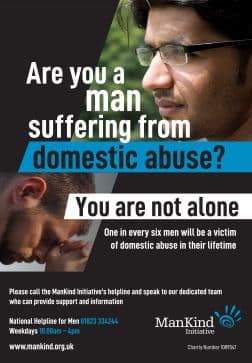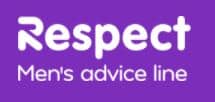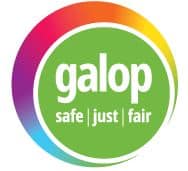If you are (or suspect you are) a male victim of domestic abuse – you are not alone.
There are many organisations that can help you and most offer an anonymous service and have quick to escape webpages so your partner cannot see that you’ve accessed their website. Many of these services are for those in all types of relationships including same sex relationships and there are also specific services for those from from the LGBTQI+ community if you would prefer to talk to them.
There are many different types of domestic abuse. Mankind says:
Most men do not believe or feel they are a victim until sometime after they no longer have control of their life and have become isolated. One survivor said they felt they were being ‘groomed’. Remember though you are not to blame, you are not weak and your are not alone. There is help available and you (and your children) can escape.”
According to the Office for National Statistics one in three people reporting domestic abuse are male. other statistics are:
- Of domestic abuse crimes recorded by the police, 26% were committed against men. This equates to c155,000 offences per year.
- Only 4.4% of victims of domestic abuse being supporting by local domestic services are men according to SafeLives data.
- Over the pandemic period, the charity Mankind saw an increase of calls to its helpline by one quarter and visits to its website by 75%.
- 61% of the men who call the ManKind Initiative helpline have never spoken to anyone before about the abuse they are suffering and 64% would not have called if the helpline was not anonymous.
There is support available:
Call: 01823 334244 (Mon to Fri 10am to 4pm)
If you are a male victim of domestic abuse, you are not alone, ManKind are there for you. No matter what your background, age, job, race or sexuality, they are here to listen, provide support and give you information including signposting you to appropriate local services.
One is six men will be a victim of domestic abuse in their lifetime:
You are not weak
You are not alone
What is Men’s Advice Line?
Men’s Advice Line is a confidential helpline for male victims of domestic abuse and those supporting them. They offer advice and emotional support to men who experience abuse, and signpost to other vital services that help keep them and their children safe.
Who can call Men’s Advice Line?
Men’s Advice Line is aimed at men who are experiencing domestic abuse, but they also take calls from family members, friends or practitioners and frontline workers.
Is the call confidential?
Yes. Any data taken is kept in line with our privacy policy that can be accessed here. If there’s concern over your safety, they may, by law, be required to share or disclose your information to relevant external parties. You can contact them for confidential advice and support here.
Is there a screening process for callers?
No one has to prove that they are a victim to access the service. All callers are offered the best help possible.
Are callers assessed?
Callers are asked questions to help identify their risks and needs, but they don’t conduct assessments on the phone. The helpline staff use the time available to offer the best support they can for the caller’s situation.
The advice I received made me feel valid both as a man and a victim of abuse. It allowed me to come to terms with what happened and my feelings towards it. I now feel in a much better position regarding moving on with my life. Knowing I can call back any time is very comforting.
Raj – Respect Mens Advice Line caller
National LGBT+ Domestic Abuse Helpline 0800 999 5428
The helpline is for LGBT+ people who have or are experiencing domestic abuse. GALOP are also here for people supporting a survivor of domestic abuse; friends, families and those working with a survivor.
There are different ways to contact them. All of them are free:
Phone 0800 9995428 The helpline is open: Monday to Friday 10am – 5pm & Wednesday and Thursday 10am – 8:00pm
email help@galop.org.uk
Webchat The webchat is available: Wednesday and Thursday 5pm – 8pm
They are open 5 days a week and closed at weekends and on bank holidays and will call you back if you can’t get through to us the first time.
Chatbot The chatbot is available 24 hours a day, 7 days a week for those who do not need immediate help.
Support services Galop provides advocacy and casework support for LGBT+ people who have experienced abuse and violence. Advocates and caseworkers work with clients, based on what each individual person needs. The advocacy service specialises in supporting LGBT+ victims and survivors of domestic abuse, hate crime, sexual violence, and other forms of abuse including honour-based violence, forced marriage, and so-called conversion therapies. They are a service run by LGBT+ people, for LGBT+ people, and the needs of our community are at the centre of what we do.
Talking about abuse and violence can be difficult enough, without worrying that your identity, relationships, or what happened to you might be questioned or misunderstood. GALOP are LGBT+ people working with LGBT+ people. They understand the range of orientations, gender identities and forms of expression, and relationship models within your community, and provide a welcoming space for all LGBT+ people.
How can GALOP help?
Their advocates provide a range of services and work in partnership with other agencies so they can offer wide-ranging support to LGBT+ victim/survivors:
- Advice and support to help you and others to be safer
- Advice on your rights and options
- Ongoing emotional support
- Urgent help, including medical support, even if you’re not sure about talking to the police
- Assistance and advocacy around navigating the criminal justice system
- Information on safety and emergency housing options
- Referrals or signposting to specialist or local LGBT+ services and organisations
- Translation services are available to those who do not have English as a first language, and we can access a BSL interpreter if you are deaf / have a hearing impairment.






